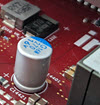
On Wednesday, November 22, we had our second CaSA, Computer and System Architecture Unraveled, meetup. Same place in Kista as the last time, the 25th floor of the Kista Science Tower building, thanks to the kind sponsorship of Vasakronan and our collaboration with Kista Science City. This time, the theme was networking – but not at the socket level. Per Holmberg presented how his team used “micro sleep” for power management in line-rate network processing, and Hans Brandberg talked about the Precision Time Protocol. Another great event!
Continue reading ““Packet Networks are not Socket Science” – Computer and System Architecture Unraveled Event Two”
 Last year,
Last year,  Traditional hardware design languages like
Traditional hardware design languages like